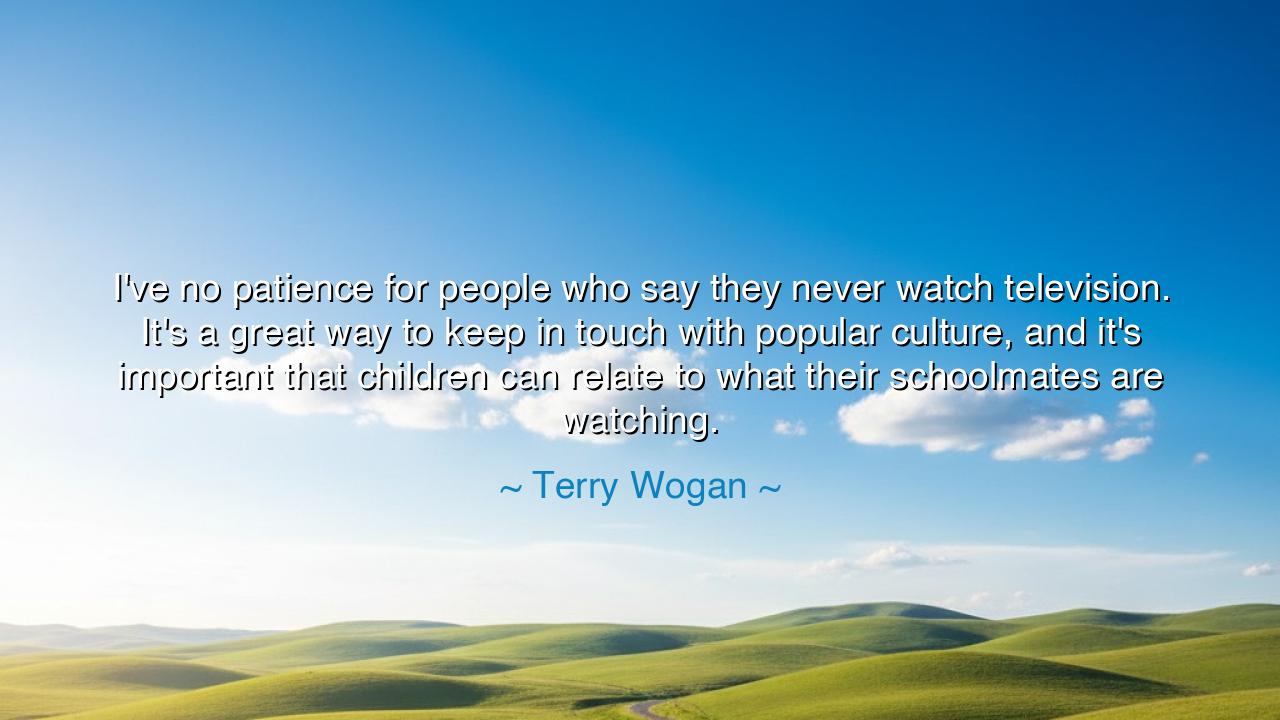
I've no patience for people who say they never watch television.
I've no patience for people who say they never watch television. It's a great way to keep in touch with popular culture, and it's important that children can relate to what their schoolmates are watching.






Terry Wogan, beloved voice of the airwaves, once declared: “I’ve no patience for people who say they never watch television. It’s a great way to keep in touch with popular culture, and it’s important that children can relate to what their schoolmates are watching.” At first, these words may appear light, a casual defense of entertainment. But upon reflection, they reveal a profound insight into the nature of community, culture, and the bonds that tie generations together. Wogan, in his gentle wisdom, reminds us that shared stories—whether sung by the bard, written on the scroll, or broadcast on the screen—are the very threads that weave society.
In the ancient days, before television, there were fireside gatherings. Tribesmen sat together and listened to tales of heroes, of gods, of the deeds of their ancestors. These stories were not simply diversions; they were the glue of unity, teaching children who they were, where they came from, and how to belong. When Wogan speaks of television, he is not merely defending a box of images and sound, but echoing the timeless truth: shared stories create shared identity. Without such common ground, people drift into isolation, unable to speak the same cultural language as their peers.
Consider the epic of Homer’s Iliad. It was not read in solitude by a chosen few, but recited aloud for all to hear—warriors, women, and children alike. In knowing the tale of Achilles and Hector, the Greeks found themselves connected, bound to a common heritage. So too today, a child who knows what his classmates are watching participates in a modern kind of epic, the shared story of popular culture. And when a parent denies that child this connection, they risk leaving them isolated, voiceless in the chorus of their peers. Wogan’s words remind us that belonging begins with the stories we share.
Yet, his saying also carries a rebuke. “I’ve no patience for people who say they never watch television.” Why such impatience? Because to dismiss television outright is often a performance of superiority, a declaration of detachment from the people’s stories. The ancients too had such figures—the philosophers who scorned the theatre, the aristocrats who mocked the songs of the common folk. But Wogan’s wisdom pierces through: culture belongs to all, not only the “high” or the “low.” To turn away from the people’s stories is to turn away from the people themselves.
There is also a deeper lesson here about children. Wogan emphasizes that it is not only adults who must connect, but the young who must find their place among peers. For a child left without the common tongue of play and reference is a child made an outsider. Just as in ancient villages, where children learned the myths and games of their age to join the circle of belonging, so too must children today know the stories their classmates share. In this way, television is not mere distraction—it is a bridge into fellowship.
The lesson for us, then, is clear. Do not despise the shared entertainments of your time. See in them the same role that myths and ballads once played: the crafting of community, the weaving of fellowship, the grounding of the individual in a collective story. Even when such tales seem light, even when they are but comedies or dramas of daily life, they matter—because they are the language of connection.
So, dear listener, carry Wogan’s words in your heart: embrace the shared stories of your people, not with disdain, but with gratitude. Partake in popular culture, not to lose yourself in it, but to find yourself among others. Teach your children to walk not as strangers, but as companions in the circle of their peers. For in every age, whether through epic poetry, the stage, the radio, or the glowing screen, the truth remains: a people without shared stories is a people without unity.






AAdministratorAdministrator
Welcome, honored guests. Please leave a comment, we will respond soon